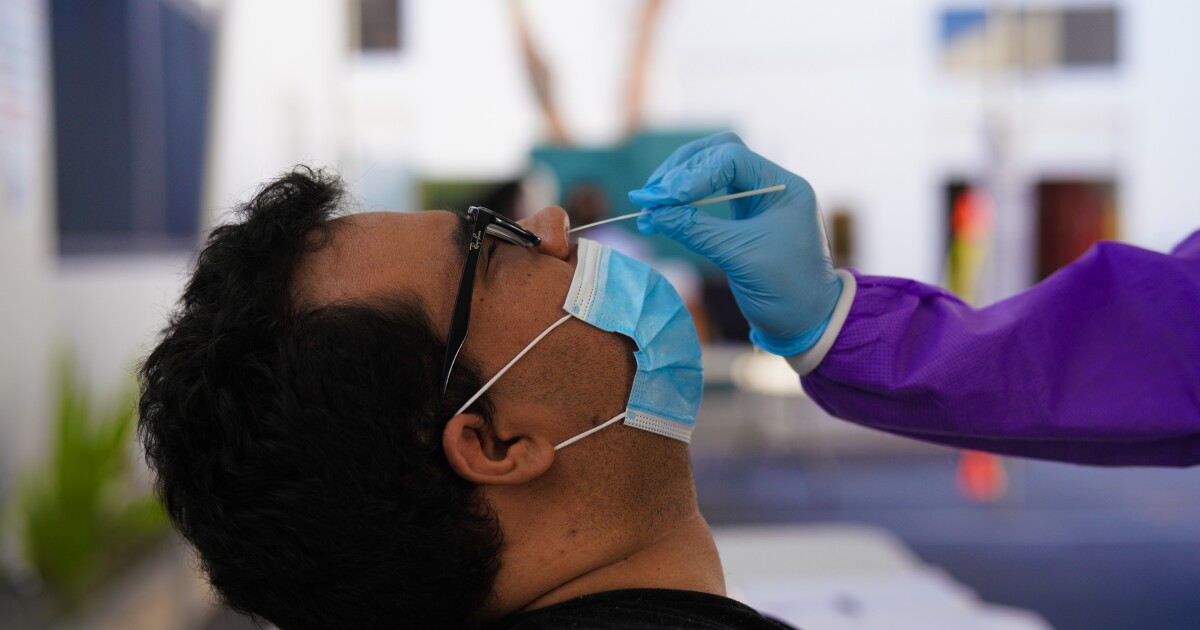
At San Diego’s Pegasus Building Services this week, employees and their families lined up to get tested for the coronavirus in what might become routine in the business world.
The janitorial company is requiring testing for those who work in its offices and recommending it for the company’s custodians. Those cleaning services are likely to be in high demand as businesses across the economy begin to reopen.
It’s something of a brave new world for Pegasus, which is trying to figure out how often they need to test employees to keep everyone healthy.
“They are ahead of the curve here, based on what I’ve heard,”said On Amir, a behavioral scientist at UC San Diego’s Rady School of Management. “As long as there’s no reliable vaccine, this is a policy that you’d expect to see more and more of.”
Advertisement
The essential workers that other essential businesses need
Pegasus’s roughly 400 San Diego custodians are the essential workers that keep other essential businesses afloat. They often work late nights and early mornings cleaning places such as the hospitals of Scripps Health or the labs of Sanford Burnham Prebys Medical Discovery Institute.
Marina Ochoa typically clocks in around 5 p.m. and works into the night cleaning human resource offices. Because of COVID-19, she’s concerned that she might be bringing the coronavirus back to her family when she returns to her Mission Valley home at the end of each shift.
“I’m worried because people have been telling me that there are some other buildings where some employees have been having coronavirus,” said Ochoa, 31, a mother of five, including a 1-year-old. “I’m just scared.”
Advertisement
For Ochoa and other Pegasus custodians, Wednesday’s testing was not mandatory. But the tests were advertised as a way for them and their families to know whether they are or have been infected with the novel coronavirus.
“We wanted this testing, but we thought it would cost too much money,” said Margarita Martinez, Ochoa’s mother, in Spanish shortly after getting tested alongside her daughter.
PMH Laboratory, a lab based in Huntington Beach, performed the tests. Testing costs will either be covered through employee health insurance, in accordance with the CARES Act, or through Medi-Cal for the uninsured.
The lab offered an antibody test, which uses a blood sample to detect immune proteins that grip the virus, as well as a molecular test, which uses a nasal swab to check for viral genetic material. Antibody tests are useful for knowing who has already been infected, while molecular tests identify who is infected now.
Advertisement
More than 100 employees and families scheduled testing appointments, according to Steve Kuzmack, an insurance broker and outreach coordinator for PMH Laboratory. Many lined up under the shade of a giant white tent, each person’s position marked with cones spaced 6 feet apart. All wore face coverings. A pair of nurses clad in purple scrubs, gloves and face shields beckoned participants forward.
As an in-the-office employee, Rob Rubright, Pegasus’s information technology manager, was required to get tested before he can return to the office full-time. Rubright, 57, has two pre-existing conditions linked to COVID-19 (high blood pressure and diabetes) and wanted to make sure that he won’t infect family, friends or the public: “I just feel an obligation to be responsible.”
Those tested will get their results via an online portal or a phone call in one to three days. Employees who test positive for the coronavirus must report their results to human resources and will continue to be paid while they self-quarantine for two weeks, said Diana Lopez, Pegasus’s human resources manager.
PMH has been especially busy lately. The certified lab is working with the Venetian in Las Vegas to get thousands of hotel employees tested. That has meant late hours for Desiree Hedge, a clinical laboratory scientist and owner of PMH Laboratory.
Advertisement
“I’m working 16, 18-hour days, seven days a week.” Hedge said. “We want to help and we’re working endlessly around the clock to make it happen.”
But while performing broad-based testing is its own challenge, using those results to make decisions is still another. For instance, antibody testing can identify those who’ve already been infected with the coronavirus, but scientists still aren’t certain whether these people are protected against re-infection. And while one-time testing events might give employees peace of mind, it doesn’t guarantee an employee’s long-term safety.
“I don’t think testing one time is the answer,” said Jeff Becker, president of Pegasus. “I could drive away tomorrow, head to the office, stop to get gas and get contaminated on the gas pump.”
Becker plans to have employees’ temperatures taken daily and hopes to test for the coronavirus regularly. But how regularly and how costly that would be for the company are open questions. For now, he says, he’s trying to safely move the company forward through these uncertain times.
Advertisement
“I’m doing my best to make sure that the people that come to work in my office have peace of mind that the people they’re working with are not going to get them sick,” Becker said. “The only way we can do that right now and get the world back to some sense of normalcy is to test. I understand that it’s not perfect, but it’s the best thing we can do right now.”
"company" - Google News
May 24, 2020 at 06:04AM
https://ift.tt/3ekHdKx
Here's how one San Diego company is testing its employees for the coronavirus - The San Diego Union-Tribune
"company" - Google News
https://ift.tt/33ZInFA
https://ift.tt/3fk35XJ
Bagikan Berita Ini















0 Response to "Here's how one San Diego company is testing its employees for the coronavirus - The San Diego Union-Tribune"
Post a Comment